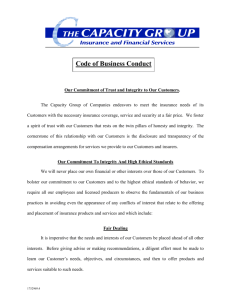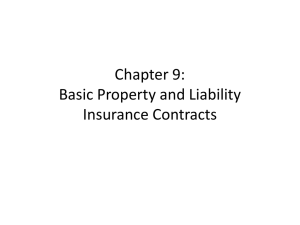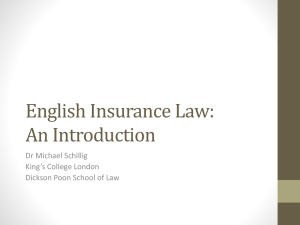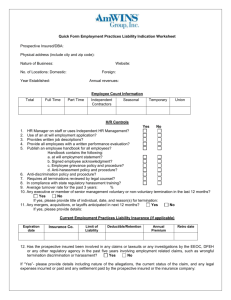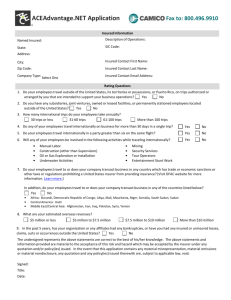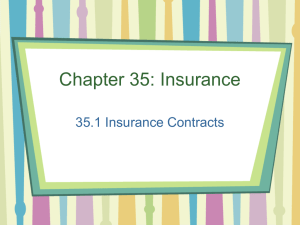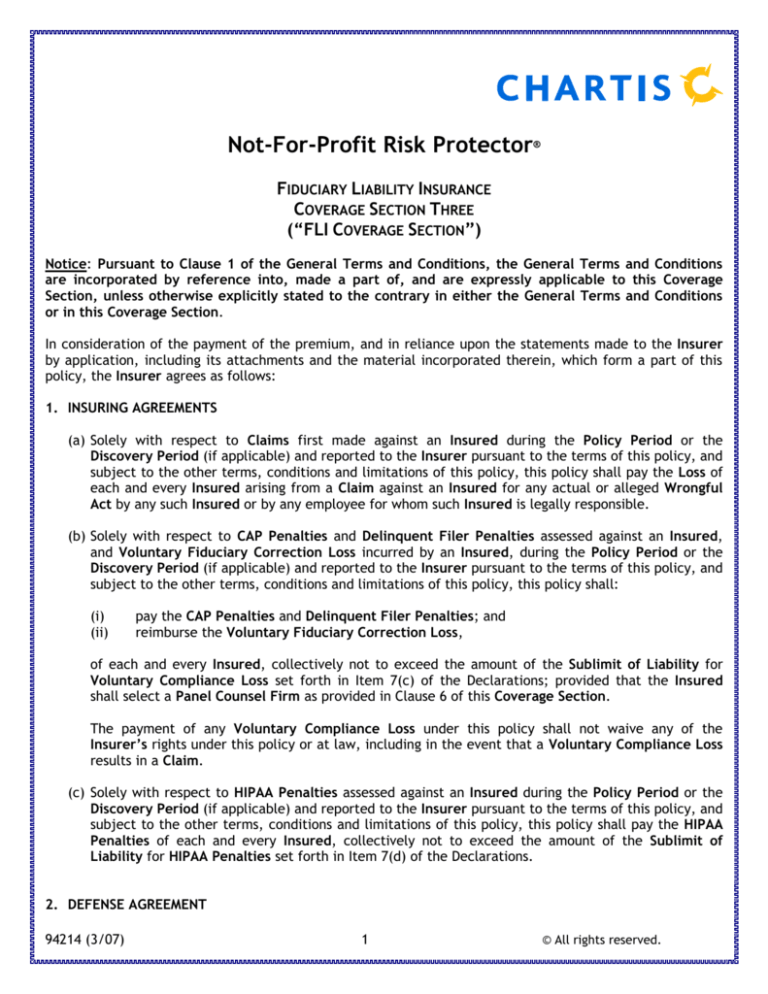
Not-For-Profit Risk Protector®
FIDUCIARY LIABILITY INSURANCE
COVERAGE SECTION THREE
(“FLI COVERAGE SECTION”)
Notice: Pursuant to Clause 1 of the General Terms and Conditions, the General Terms and Conditions
are incorporated by reference into, made a part of, and are expressly applicable to this Coverage
Section, unless otherwise explicitly stated to the contrary in either the General Terms and Conditions
or in this Coverage Section.
In consideration of the payment of the premium, and in reliance upon the statements made to the Insurer
by application, including its attachments and the material incorporated therein, which form a part of this
policy, the Insurer agrees as follows:
1. INSURING AGREEMENTS
(a) Solely with respect to Claims first made against an Insured during the Policy Period or the
Discovery Period (if applicable) and reported to the Insurer pursuant to the terms of this policy, and
subject to the other terms, conditions and limitations of this policy, this policy shall pay the Loss of
each and every Insured arising from a Claim against an Insured for any actual or alleged Wrongful
Act by any such Insured or by any employee for whom such Insured is legally responsible.
(b) Solely with respect to CAP Penalties and Delinquent Filer Penalties assessed against an Insured,
and Voluntary Fiduciary Correction Loss incurred by an Insured, during the Policy Period or the
Discovery Period (if applicable) and reported to the Insurer pursuant to the terms of this policy, and
subject to the other terms, conditions and limitations of this policy, this policy shall:
(i)
(ii)
pay the CAP Penalties and Delinquent Filer Penalties; and
reimburse the Voluntary Fiduciary Correction Loss,
of each and every Insured, collectively not to exceed the amount of the Sublimit of Liability for
Voluntary Compliance Loss set forth in Item 7(c) of the Declarations; provided that the Insured
shall select a Panel Counsel Firm as provided in Clause 6 of this Coverage Section.
The payment of any Voluntary Compliance Loss under this policy shall not waive any of the
Insurer’s rights under this policy or at law, including in the event that a Voluntary Compliance Loss
results in a Claim.
(c) Solely with respect to HIPAA Penalties assessed against an Insured during the Policy Period or the
Discovery Period (if applicable) and reported to the Insurer pursuant to the terms of this policy, and
subject to the other terms, conditions and limitations of this policy, this policy shall pay the HIPAA
Penalties of each and every Insured, collectively not to exceed the amount of the Sublimit of
Liability for HIPAA Penalties set forth in Item 7(d) of the Declarations.
2. DEFENSE AGREEMENT
94214 (3/07)
1
© All rights reserved.
(a) INSURER’S DUTY TO DEFEND
Except as hereinafter stated, the Insurer shall have both the right and duty to defend any Claim
against an Insured alleging a Wrongful Act, even if such Claim is groundless, false or fraudulent.
The Insured shall have the right to effectively associate with the Insurer in the defense of any
Claim, including, but not limited to, negotiating a settlement, subject to the provisions of this Clause
2. However, the Insurer shall not be obligated to defend any Claim after the Policy Aggregate Limit
of Liability or any Separate Limit of Liability or Shared Limit of Liability (if any) has been
exhausted, or pursuant to subparagraph (c) below, after the rejection of a settlement offer.
(b) INSURED'S OPTION TO ASSUME DEFENSE
Notwithstanding the above, the Insureds shall have the right to assume the defense of any Claim
made against them. This right shall be exercised in writing by the Organization on the behalf of all
Insureds within sixty (60) days of the reporting of the Claim to the Insurer pursuant to Clause 7 of
the General Terms and Conditions of the policy. Upon receipt of such written request, the Insurer
shall tender the defense of the Claim to the Insureds. Once the defense has been so tendered, the
Insurer cannot re-assume the defense of the Claim. The Insurer shall have the right to effectively
associate with the Insureds in the defense of any Claim, including but not limited to negotiating a
settlement. Provided that the Insurer shall be permitted to effectively associate with the Insureds
in the defense of any Claim, including but not limited to negotiating a settlement of any Claim, the
Insurer's consent to settlements, stipulated judgments and Defense Costs shall not be unreasonably
withheld.
(c) GENERAL PROVISIONS (applicable to 2(a) and 2(b) above)
The Insurer shall advance Defense Costs prior to the final disposition of a Claim, subject to the
other provisions of this policy. Such advance payments by the Insurer shall be repaid to the Insurer
by the Insureds, severally according to their respective interests, in the event and to the extent that
the Insureds shall not be entitled under the terms and conditions of this policy to payment of such
Loss.
The Insured(s) shall not admit or assume any liability, enter into any settlement agreement,
stipulate to any judgment, or incur any Defense Costs without the prior written consent of the
Insurer. Only those settlements, stipulated judgments and Defense Costs which have been
consented to in writing by the Insurer shall be recoverable as Loss under the terms of this policy.
The Insured(s) shall give the Insurer full cooperation and such information as the Insurer may
reasonably require. In the event the Insureds do not consent to a Settlement Opportunity, then,
subject to the Policy Aggregate Limit of Liability and Separate Limit of Liability or Shared Limit of
Liability, if any, the Insurer’s liability for all Loss on account of such Claim shall not exceed: (1) the
amount for which the Insurer could have settled such Claim plus Defense Costs incurred as of the
date such settlement was proposed in writing by the Insurer (“Settlement Opportunity Amount”),
plus (2) 50% of covered Loss in excess of such Settlement Opportunity Amount, it being a condition
of this insurance that the remaining 50% of such Loss excess of the Settlement Opportunity Amount
shall be carried by the Organization and the Insureds at their own risk and be uninsured.
Notwithstanding the foregoing, this paragraph shall not apply until the Settlement Opportunity
Amount exceeds the applicable Retention amount stated in Item 3 of the Declarations.
Selection of counsel to defend the Claim made against the Insureds shall be governed by Clause 6 of
this Coverage Section (if applicable).
94214 (3/07)
2
© All rights reserved.
3. DEFINITIONS
(a) “Administrator” means an Insured with respect to any Wrongful Act described in subparagraph
3(dd)(2) of the Definition of “Wrongful Act” in this Coverage Section.
(b) “Benefits” means any obligation under a Plan to a participant or beneficiary under a Plan which is a
payment of money or property, or the grant of a privilege, right, option or perquisite.
(c) “Breach of Fiduciary Duty” means a violation of the responsibilities, obligations or duties imposed
upon Insureds by ERISA.
(d) “Cafeteria Plan” means a plan as defined in Section 125 of the Internal Revenue Code of 1986, as
amended or a plan from which the participants may choose among two or more benefits consisting of
cash and qualified benefits.
(e) “CAP Penalties” means fines, penalties, sanctions, voluntary correction fees, compliance fees or
user fees assessed against or collected from an Insured by the Internal Revenue Service (IRS)
pursuant to a written agreement to correct an inadvertent Plan defect under an Employee Plans
Compliance Resolution System established by the Internal Revenue Service, provided that such
agreement to correct such Plan defect was entered into in writing by the Insured with the IRS during
the Policy Period (or during the policy period of a policy issued by the Insurer of which this policy is
a continuous renewal).
(f) “Claim” means:
(1) a written demand for monetary, non-monetary or injunctive relief;
(2) a civil, criminal or arbitration proceeding for monetary, non-monetary or injunctive relief
which is commenced by:
(i) service of a complaint or similar pleading;
(ii) return of an indictment (in the case of a criminal proceeding); or
(iii) receipt or filing of a notice of charges;
(3) a formal agency adjudicative proceeding anywhere in the world to which an Insured is
subject; or
(4) any fact-finding investigation by the U.S. Department of Labor, the Pension Benefit Guaranty
Corporation or similar governmental agency which is located outside of the United States.
(g) “Consulting Fees” means fees charged by a third party actuary, benefits consultant or accountant
resulting solely from the correction of an actual or potential Breach of Fiduciary Duty, but
excluding any fees, costs or expenses associated with: (i) a Plan audit; or (ii) identifying, finding or
assessing such Breach of Fiduciary Duty.
(h) “Defense Expenses” means reasonable and necessary attorney’s fees, costs or expenses consented
to in writing by the Insurer resulting solely from the correction of an actual or potential Breach of
Fiduciary Duty, but excluding any fees, costs and expenses associated with finding or assessing such
Breach of Fiduciary Duty and any compensation of Individual Insureds or employees of an Insured.
(i) “Delinquent Filer Penalties” means penalties assessed by the U.S. Department of Labor or the IRS
under a Delinquent Filer Voluntary Compliance Program for inadvertent failure to file Form 5500,
provided that the failure to file such Form 5500 occurred during the Policy Period (or during the
policy period of a policy issued by the Insurer of which this policy is a continuous renewal).
94214 (3/07)
3
© All rights reserved.
(j) “Dependent Care Assistance Program” means a dependent care assistance program as defined in
Section 129 of the Internal Revenue Code of 1986, as amended.
(k) “Employee Benefit Law” means ERISA or any similar common or statutory law of the United States
of America, Canada or any state or other jurisdiction anywhere in the world to which a Plan is
subject. Solely with respect to subparagraph 3(dd)(2) of the definition of Wrongful Act in this FLI
Coverage Section, Employee Benefit Law shall also include HIPAA Privacy Regulations and any laws
concerning unemployment insurance, Social Security, government-mandated disability benefits or
similar law. Except as provided in the previous sentence, Employee Benefit Law shall not include
any law concerning workers’ compensation, unemployment insurance, Social Security, governmentmandated disability benefits or similar law.
(l) “ERISA” means the Employee Retirement Income Security Act of 1974 (including, but not limited to,
amendments relating to the Consolidated Omnibus Budget Reconciliation Act of 1985, the Health
Insurance Portability and Accountability Act of 1996, the Newborns’ and Mothers’ Health Protection
Act of 1996, the Mental Health Parity Act of 1996, the Women’s Health and Cancer Rights Act of
1998, and the Pension Protection Act of 2006), and including any amendment or revision thereto.
(m) “ESOP” means any employee stock ownership plan as defined in ERISA, or any other Plan under
which investments are made primarily in securities of (i) the Organization, (ii) any acquired
Subsidiary, or (iii) any parent of any acquired Subsidiary, or whose assets at any time within twelve
(12) months prior to the inception date of this policy were comprised of ten percent (10%) or more of
securities of (i) the Organization, (ii) any acquired Subsidiary, or (iii) any parent of any acquired
Subsidiary.
(n) “Fiduciary” means a fiduciary as defined in any applicable Employee Benefit Law with respect to a
Plan, or a person or entity who exercises discretionary control respecting the management of a Plan
or the disposition of its assets.
(o) ”Fringe Benefit” means any plan or benefit described in Section 132 of the Internal Revenue Code of
1986, as amended.
(p) “HIPAA Penalties” means civil money penalties imposed upon an Insured for violation of HIPAA
Privacy Regulations the privacy provisions of the Health Insurance Portability and Accountability Act
of 1996 and any rules or regulations promulgated thereunder.
(q) “HIPAA Privacy Regulations” means the privacy provisions of the Health Insurance Portability and
Accountability Act of 1996 and any rules or regulations promulgated thereunder.
(r) “Individual Insured” means any past, present or future natural person director, officer or employee
of the Organization or, if applicable, of a Plan, and as to all of the above, in his or her capacity as a
Fiduciary, Administrator or trustee of a Plan.
(s) “Insured(s)” means:
(1)
(2)
(3)
(4)
94214 (3/07)
any Individual Insured;
any Plan(s);
the Organization;
any other person or entity in his, her or its capacity as a Fiduciary, Administrator or trustee
of a Plan who is included in the Definition of “Insured” by specific written endorsement
attached to this policy.
4
© All rights reserved.
(t) “IRA-based Plan” means any payroll deduction IRA (Individual Retirement Account), SEP (Simplified
Employee Pension Plan), SARSEP (Salary Reduction Simplified Employee Pension Plan) or SIMPLE IRA
(Savings Incentive Match Plan for Employees), established or administered by the Organization,
solely for the benefit of the employees and/or the directors or officers of the Organization;
(u) “Loss” means damages, judgments (including pre and post-judgment interest on that part of any
covered judgment under this Coverage Section), settlements and Defense Costs; however, Loss
shall not include: (1) civil or criminal fines or penalties imposed by law, except (i) to the extent set
forth in Item 7(c) of the Declarations for Voluntary Compliance Loss, (ii) UK Fines and Penalties,
(iii) the five percent (5%) or less civil penalty imposed upon an Insured under Section 502(i) of ERISA,
(iv) the twenty percent (20%) or less penalty imposed upon an Insured under Section 502(l) of ERISA,
with respect to covered settlements or judgments under this Coverage Section, and (v) to the extent
set forth in Item 7(d) of the Declarations for HIPAA Penalties; (2) the multiplied portion of
multiplied damages; (3) taxes or tax penalties; (4) any amount for which an Insured is not financially
liable or which is without legal recourse to the Insured; (5) Benefits, or that portion of any
settlement or award in an amount equal to such Benefits, unless and to the extent that recovery of
such Benefits is based upon a covered Wrongful Act and is payable as a personal obligation of an
Individual Insured; or (6) matters which may be deemed uninsurable under the law pursuant to
which this policy shall be construed.
Where permitted by law, Loss shall include punitive or exemplary damages imposed upon any
Insured (subject to the policy’s other terms, conditions and exclusions, including but not limited to
exclusions relating to profit, deliberate fraud or criminal acts and knowing or willful violation of any
statute, rule or law, including but not limited to Employee Benefit Law).
Defense Costs shall be provided for items specifically excluded from Loss pursuant to subparagraphs
(1)-(6) above of this Definition, subject to the other terms, conditions and exclusions of this policy.
Loss shall include Voluntary Compliance Loss.
(v) “Non-qualified Plan” means any of the following plans for a select group of management or highly
compensated directors, officers and/or employees: deferred compensation plan, supplemental
executive retirement plan, top-hat plan or excess benefit plan.
(w) “Pension Plan” means a pension plan as defined in any Employee Benefit Law, including but not
limited to any plan formed pursuant to Section 403(b) or Section 457 of the Internal Revenue Code.
(x) “Plan” means automatically, any plan, fund, trust or program (including, but not limited to, any IRAbased Plan, Welfare Plan, Cafeteria Plan, Dependent Care Assistance Program, Fringe Benefit,
Non-qualified Plan, or qualified Pension Plan), established anywhere in the world, which was, is or
shall be sponsored solely by the Organization, or sponsored jointly by the Organization and a labor
organization, solely for the benefit of the employees and/or the directors and officers of the,
subject to the following provisions:
(1) if such Plan is a Pension Plan(s), other than an ESOP or Pension Plan described in
subparagraphs (5)(a), (5)(b), 6(a) or 6(b) below, then the Named Organization shall
provide written notice of such Plan to the Insurer prior to the inception date of this
policy, unless such Plan was already covered under a policy issued by the Insurer of which
this policy is a continuous renewal;
(2) if such Plan was sold, spun-off or terminated prior to the inception date of this policy the
Named Organization shall provide written notice of such sale, spin-off or termination to
the Insurer prior to the inception date of this policy and pay any required premium
relating to such Plan, unless such sale, spin-off or termination had already been reported
94214 (3/07)
5
© All rights reserved.
to the Insurer under a policy issued by the Insurer of which this policy is a continuous
renewal;
(3) if such Plan is sold, spun-off or terminated during the Policy Period, the Named
Organization shall provide written notice of such sale, spin-off or termination to the
Insurer prior to the end of the Policy Period;
(4) if such Plan is an ESOP or stock option plan, the Named Organization shall provide
written notice of such Plan to the Insurer unless such Plan was already covered under a
policy issued by the Insurer of which this policy is a continuous renewal and such Plan is
added to the Definition of Plan by specific written endorsement attached to this policy;
(5) if such Plan is a Pension Plan (other than an ESOP) and:
(a) is acquired during the Policy Period as a result of the Named Organization’s
acquisition of a Subsidiary whose assets total less than 25% of the total
consolidated assets of the Named Organization as of the inception date of this
policy; or
(b) is acquired during the Policy Period and such Plan’s assets total less than 25% of
the total consolidated assets of all covered Pension Plans as of the inception date
of this policy;
then this policy shall apply to such Plan (but solely with respect to a Wrongful Act(s)
occurring after the date of such acquisition). The Named Organization shall provide the
Insurer with full particulars of such new Plan before the end of the Policy Period; or
(6) if such Plan is a Pension Plan (other than an ESOP) and:
(a) is acquired during the Policy Period as a result of the Named Organization’s
acquisition of a Subsidiary whose assets total more than 25% of the total
consolidated assets of the Named Organization as of the inception date of this
policy; or
(b) is acquired during the Policy Period and such Plan’s assets total more than 25% of
the total consolidated assets of all covered Pension Plans as of the inception date
of this policy,
then, this policy shall apply to such Plan (but solely with respect to a Wrongful Act(s)
occurring after the date of such acquisition), but only upon the condition that within 90
days of its acquisition, the Named Organization shall have provided the Insurer with a
completed application for such new Plan and agreed to any additional premium or
amendment of the provisions of the policy required by the Insurer relating to such new
Plan. The 90 day reporting condition shall not apply if such new Plan does not constitute
one of the five largest Pension Plans of the Named Organization and the failure to report
such Plan within the 90 day reporting period was due to inadvertent omission by the
Named Organization and upon discovery of such Plan, the Named Organization shall
notify the Insurer as soon as practicable, provide any information required by the Insurer
relating to such Plan and pay any premium required by the Insurer relating to such Plan.
The Definition of Plan shall also include: (i) the following government-mandated programs:
unemployment insurance, Social Security, or disability benefits, but solely with respect to a
Wrongful Act defined in subparagraph (2) of the Definition of Wrongful Act in this policy; (ii) any
Pension Plan (other than an ESOP) considered or created by the Named Organization during the
Policy Period; and (iii) any other plan, fund or program, which is included in the Definition of Plan
by specific written endorsement attached to this policy.
94214 (3/07)
6
© All rights reserved.
In no event, however, shall the definition of Plan include any multiemployer plan as defined in
Employee Benefit Law.
(y) “Settlement Opportunity” means an Insurer-recommended settlement that is within the Policy
Aggregate Limit of Liability, Separate Limit of Liability or Shared Limit of Liability, if any, and
that is acceptable to the claimant.
(z) “UK Fines and Penalties” means civil fines and penalties assessed against an Insured by either the
Pensions Ombudsman appointed by the Secretary of State for Social Services in the United Kingdom,
by the Occupational Pensions Regulatory Authority in the United Kingdom, by the Pensions Regulator
in the United Kingdom, or any successor body thereto, subject to the other terms, conditions and
exclusions of the policy.
(aa) “Voluntary Compliance Loss” means CAP Penalties, Delinquent Filer Penalties and Voluntary
Fiduciary Correction Loss.
(bb) “Voluntary Fiduciary Correction Loss” means damages, Defense Expenses and Consulting Fees
incurred in connection with the U.S. Department of Labor’s (“DOL”) Voluntary Fiduciary Correction
Program as set forth in the Federal Register, resulting from an inadvertent Breach of Fiduciary
Duty occurring during the Policy Period (or during the policy period of a policy issued by the
Insurer of which this policy is a continuous renewal), provided that such compliance with the
DOL’s Voluntary Fiduciary Correction Program results in the Insured obtaining a “No Action” letter
from the DOL; however, Voluntary Fiduciary Correction Loss shall not include: (1) civil or
criminal fines or penalties imposed by law; (2) punitive or exemplary damages; (3) the multiplied
portion of multiplied damages; (4) taxes or tax penalties; (5) any amount for which an Insured is
not financially liable or which is without legal recourse to the Insured; (6) Benefits, or that
portion of damages equal to such Benefits; (7) matters of which the Insured had knowledge prior
to the inception date of this policy or the first policy issued by the Insurer to the Named
Organization of which this policy is a continuous renewal; or (8) matters which may be deemed
uninsurable under the law pursuant to which this policy shall be construed.
(cc) “Welfare Plan” means a welfare plan as defined in Employee Benefit Law.
(dd) “Wrongful Act” means:
(1) as respects an Insured: a violation of any of the responsibilities, obligations or duties imposed
upon Fiduciaries by Employee Benefit Law; or any matter claimed against an Insured solely
by reason of his, her or its status as a Fiduciary, but only with respect to a Plan; and
(2) as respects an Administrator, any act, error or omission solely in the performance of one or
more of the following administrative duties or activities, but only with respect to a Plan:
(i) counseling employees, participants and beneficiaries;
(ii) providing interpretations;
(iii) handling of records; or
(iv) activities effecting enrollment, termination or cancellation of employees, participants
and beneficiaries under the Plan,
or any matter claimed against an Insured solely by reason of his, her or its status as an
Administrator, but only with respect to a covered Plan.
(3) as respects an Individual Insured, any matter claimed against him or her arising out of his or
her service as a Fiduciary or Administrator of any multiemployer plan as defined by ERISA,
94214 (3/07)
7
© All rights reserved.
but only if such service is at the specific written request or direction of the Named
Organization and such multiemployer plan is added by specific written endorsement attached
to this policy, identified as a multiemployer plan and any required premium is paid. In no
event shall coverage under this policy extend to a Claim against a multiemployer plan itself,
its contributing employer(s) or any other fiduciaries or administrators of such plan, other than
an Individual Insured.
4. EXCLUSIONS
The Insurer shall not be liable to make any payment for Loss in connection with any Claim made against
an Insured:
(a) arising out of, based upon or attributable to the committing of any criminal or deliberate fraudulent
act, or any knowing or willful violation of any statute, rule or law, including, but not limited to,
Employee Benefit Law, if any final adjudication establishes that such criminal or deliberate
fraudulent act or knowing or willful violation was committed;
For the purpose of determining the applicability of the foregoing Exclusion 4(a) the facts pertaining to
and knowledge possessed by any Insured shall not be imputed to any other Individual Insured.
(b) for discrimination in violation of any law, except that this exclusion shall not apply to discrimination
in violation of Employee Benefit Law;
(c) for failure to fund a Plan in accordance with Employee Benefit Law or the Plan instrument or the
failure to collect contributions owed to the Plan; except that this exclusion shall not apply to
Defense Costs;
(d) for emotional distress or mental anguish; provided, however, that this exclusion shall not apply to
Defense Costs incurred in the defense of a Claim alleging a Breach of Fiduciary Duty;
(e) alleging, arising out of, based upon or attributable to any act or omission of an Insured in his, her or
its capacity as a Fiduciary or Administrator of any plan, fund or program, other than a Plan as
defined in this policy, or by reason of his, her or its status as a Fiduciary or Administrator of such
other plan, fund or program; or
(f) alleging, arising out of, based upon or attributable to any Wrongful Act as respects the Plan taking
place at any time when the Organization did not sponsor such Plan or when the Individual Insured
was not a Fiduciary, Administrator, trustee, director(s), officer(s) or employee of the Organization
or if applicable, a Plan.
5. LIMIT OF LIABILITY
Clause 5 of the General Terms and Conditions is modified to the extent necessary to provide the
following:
The maximum limit of the Insurer’s liability for all Voluntary Compliance Loss occurring during the
Policy Period or the Discovery Period (if applicable), in the aggregate, shall be the amount set forth in
Item 7(c) of the Declarations (“Voluntary Compliance Loss Sublimit of Liability”). The Voluntary
Compliance Loss Sublimit of Liability shall be part of, and not in addition to, the Policy Aggregate Limit
of Liability stated in Item 7(a) of the Declarations of this policy or any Separate Limit of Liability or
Shared Limit of Liability applicable to this Coverage Section as stated in Item 3 of the Declarations, and
shall in no way serve to increase the Insurer’s Policy Aggregate Limit of Liability or any Separate Limit
of Liability or Shared Limit of Liability as stated therein.
94214 (3/07)
8
© All rights reserved.
The maximum limit of the Insurer’s liability for all HIPAA Penalties occurring during the Policy Period or
the Discovery Period (if applicable), in the aggregate, shall be the amount set forth in Item 7(d) of the
Declarations (“HIPAA Penalties Sublimit of Liability”). The HIPAA Penalties Sublimit of Liability shall
be part of, and not in addition to, the Policy Aggregate Limit of Liability stated in Item 7(a) of the
Declarations of this policy and any Separate Limit of Liability or Shared Limit of Liability applicable to this
Coverage Section as stated in Item 3 of the Declarations, and shall in no way serve to increase the
Insurer’s Policy Aggregate Limit of Liability or any Separate Limit of Liability or Shared Limit of
Liability as stated therein.
6. PRE-AUTHORIZED DEFENSE ATTORNEYS
This Clause 6 applies only to: (1) a Claim brought by any government entity; (2) a request for coverage
for a Voluntary Compliance Loss; or (3) a Claim brought in the form of a class or representative action.
Affixed as Appendix D hereto and made a part of this policy is a list of Panel Counsel law firms ("Panel
Counsel Firm(s)") from which a selection of legal counsel shall be made to conduct the defense of any
Claim against an Insured to which this Clause 6 applies and pursuant to the terms set forth below:
In the event the Insurer is operating under a duty to defend pursuant to Clause 2(a) of this Coverage
Section, then the Insurer shall select a Panel Counsel Firm to defend the Insureds. Upon the written
request of the Named Organization, the Insurer may consent to a different Panel Counsel Firm
selected by the Named Organization to defend the Insureds, which consent shall not be unreasonably
withheld.
In the event the Insureds have assumed the defense of the Claim pursuant to Clause 2(b) of this
Coverage Section, then the Insureds shall select a Panel Counsel Firm to defend the Insured. In
addition, with the express prior written consent of the Insurer, which consent shall not be unreasonably
withheld, the Insured may select a Panel Counsel Firm different from that selected by other Insureds
if such selection is required due to an actual conflict of interest or is otherwise reasonably justifiable.
The selection of a Panel Counsel Firm from the attached list to defend the Claim against the Insureds
shall not be restricted to the jurisdiction in which the Claim is brought.
The list of Panel Counsel Firms may be amended from time to time by the Insurer. However, no
change shall be made to the specific list attached to this policy during the Policy Period without the
consent of the Named Organization. At the request of the Named Organization, the Insurer may in its
discretion add one or more law firms to the attached list of Panel Counsel Firms for the purposes of
defending the Claim made against the Insureds. The list of Panel Counsel Firms may also be amended
to add, at the sole discretion of the Insurer, a non-Panel Counsel Firm for the purpose of acting as
"local counsel" to assist an existing Panel Counsel Firm, which Panel Counsel Firm will act as "lead
counsel" in conducting the defense of the Claim, for Claims brought in a jurisdiction in which the
chosen Panel Counsel Firm does not maintain an office.
7. DISCOVERY CLAUSE
Except as indicated below, if the Named Organization shall cancel or the Insurer or the Named
Organization shall refuse to renew this Coverage Section, then solely with respect to this Coverage
Section, the Named Organization, upon payment of the respective “Additional Premium Amount”
described below, shall have the right to a period of one, two, three or six years after the effective date
of such cancellation or nonrenewal (herein referred to as the “Discovery Period”) in which to give to
the Insurer written notice of Claims first made against the Insureds during the selected period for any
Wrongful Act occurring prior to the end of the Policy Period and otherwise covered by this policy. The
94214 (3/07)
9
© All rights reserved.
rights contained in this paragraph shall terminate, however, unless written notice of such election
together with the additional premium due is received by the Insurer within thirty (30) days of the
effective date of cancellation or nonrenewal. The Additional Premium Amount for the Discovery
Period shall be fully earned at the inception of the Discovery Period. The Discovery Period is not
cancelable. This clause and the rights contained herein shall not apply to any cancellation resulting
from non-payment of premium.
The Additional Premium Amount for: (1) one year shall be 125% of the “full annual premium”; (2) two
years shall be 175% of the “full annual premium”; (3) three years shall be 200% of the “full annual
premium”; and (4) six years shall be an amount to be determined in the absolute and sole discretion of
the Insurer. As used herein, “full annual premium” means the premium level in effect for this Coverage
Section immediately prior to the end of the Policy Period.
In the event of a Transaction, as defined in Clause 9 of the General Terms and Conditions, the Named
Organization shall have the right, within thirty (30) days before the end of the Policy Period, to request
an offer from the Insurer of a Discovery Period (with respect to Wrongful Acts occurring prior to the
effective time of the Transaction) for a period of no less than six (6) years or for such longer or shorter
period as the Named Organization may request. The Insurer shall offer such Discovery Period pursuant
to such terms, conditions and premium as the Insurer may reasonably decide. In the event of a
Transaction, the right to a Discovery Period shall not otherwise exist except as indicated in this
paragraph.
[The balance of this page is left intentionally blank]
94214 (3/07)
10
© All rights reserved.


